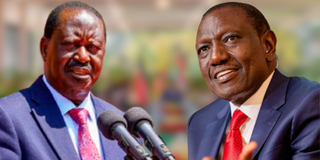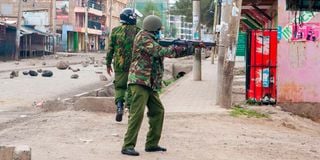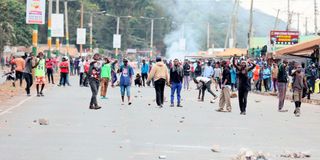Raila to Ruto: You are wrong on police shooting orders

ODM leader Raila Odinga and President William Ruto.
Former Prime Minister Raila Odinga has condemned President William Ruto’s controversial order to police to shoot protesters in the legs, warning that the directive amounts to a dangerous normalisation of extra-judicial violence and a blatant disregard for the rule of law.
In a statement on Friday, Mr Odinga described any shoot-to-kill, maim, or shock orders as illegal and inhumane, regardless of the context, and urged security agencies to uphold constitutional policing standards even in the face of unrest
“In a protest or any other environment that requires law enforcement, all the above orders, shoot to kill, maim, disorient or shock citizens, are wrong,” Mr Odinga said.
He added: "As a country, we must at all times opt for the rule of law and due process and reject the temptation to give police illegitimate and deadly powers over citizens, even when they are perceived to have broken the law.”
The former Prime Minister's remarks come in the wake of growing domestic and international criticism over police conduct during recent anti-government protests.
The State-funded Kenya National Commission on Human Rights (KNCHR) has reported that 31 people were killed and more than 100 injured during the Monday, July 7 Saba Saba day demonstrations, with more than 500 others arrested.
President Ruto, who has blamed the opposition for sponsoring what he called "violent and unconstitutional attempts to destabilise the country," publicly directed police officers to shoot individuals caught destroying property in the legs, a statement that has sparked outrage among rights groups and political leaders.
“Anyone caught burning another person's business or property should be shot in the leg, hospitalised, and later taken to court. Don't kill them, but ensure their legs are broken,” the President said in Nairobi on Wednesday.
The United Nations and global human rights organisations have accused the Kenyan security forces of excessive and lethal use of force.
The UN said it was “deeply troubled” by the reported killings and criticized what it termed the use of live ammunition against unarmed demonstrators.
Mr Odinga, in his statement, said that such actions only erode public trust in law enforcement and expose both police officers and suspects to heightened risks.
“We are all better served as a country when we stick to the principle that everyone is innocent until proven guilty, a determination that can only be made by a competent court of law,” said Mr Odinga.
“Let’s prioritize arrests and arraignment in courts over killing, maiming, or brutalizing of suspects.”
He warned that the militarisation of the police could push the country toward a dangerous trajectory, citing examples from elsewhere in Africa where similar crackdowns have led to escalating cycles of violence and instability.
President Ruto has, however, defended the police and framed the protests as a direct threat to national security.
“Kenya cannot and will not be ruled through threats, terror, or chaos. Not under my watch,” Dr Ruto said. “Any attack on police officers is a declaration of war against the country.”
He maintained that any change of leadership must happen through the ballot box and not street protests.
“This country will not be destroyed by a few people who are impatient and who want a change of government using unconstitutional means. It is not going to happen,” the president added.

A police officer aims his gun at protesters along Old Namanga road in Kitengela during Saba Saba protests on July 7, 2025.
As tensions continue to mount, Mr Odinga's statement signals a deepening rift between the opposition and government over how to handle public dissent, amid growing calls for accountability, justice for victims, and respect for fundamental freedoms.
The Head of State has, however, received backing from the chair of the National Assembly’s Defence, Intelligence and Foreign Relations Committee, Belgut MP Nelson Koech, who called for the use of extreme force by police officers on violent protestors.
In remarks that sparked public uproar, Mr Koech reiterated that police officers are allowed to “shoot to kill” if they evaluate the risk at hand and find that their lives would be in danger.
Speaking at Chebirbei, Kericho County on Wednesday, Mr Koech defended President Ruto’s order on police officers to shoot at the legs of demonstrators, adding that it should in fact be “shoot to kill” rather than “shoot to injure”.
He said nobody is allowed to attack a fellow citizen or their businesses.

Protesters block a section of Ngong Road in Nairobi during Saba Saba protests on July 7, 2025.
The Kenya Devolution Civil Society Organizations Working Group, a national umbrella forum of the Kenyan civil society networks across the 47 counties, challenged all actors—citizens, the government, and security agencies—to uphold the Constitution and respect human rights in the wake of protests.
“We call on the government to immediately cease police brutality, abductions, and forced disappearances of Kenyan citizens. Ensure police actions during public demonstrations are professional, lawful, and aimed at protecting life and property.”
They also urged the arrest and prosecution of criminals exploiting the protests to steal, destroy property, and threaten lives.
“The government must refrain from introducing laws or policies, such as the Public Order (Amendment) Bill, 2025, that would unjustly restrict civic freedoms and suppress legitimate dissent and instead address the root causes of citizen dissatisfaction—poor governance, corruption, and exclusion—through meaningful dialogue and concrete reforms.”
To Kenyans, the activists urged for the expression of their rights to peaceful protest and freedom of expression responsibly, in line with the Constitution.
“Kenyans must reject violence, looting, and destruction of public or private property, which only undermines the cause for justice and accountability. Law enforcement officers, and public property—including the assets and developments delivered through devolution must be respected and Kenyans must at all times promote national unity, cohesion, and peace during this critical period of our nation’s history.”


